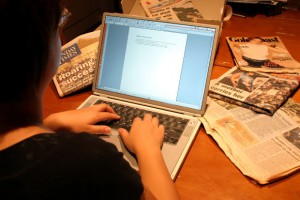

Month: January 2014
Welcome to the Busybird blog, where you can find helpful articles, updates, industry news and more. Make sure you stay up to date by signing up to our newsletter below.
Approaching Revision — Part I
January 30, 2014The Little Things
 Something regular to this blog is the demand (the harassment, really) for revision.
Something regular to this blog is the demand (the harassment, really) for revision.
That’s great in theory, but if you don’t know what you’re looking for, you can reread your piece ad nauseam without ever substantially improving it.
In this two-part blog, we’re going to list some of the little things (well, only little compared to the big picture) to look for when revising.
Passive Sentence
In a passive sentence, the subject in the sentence doesn’t perform the action. The action is performed on the subject. E.g.
- The boy was mugged by the robber.
The action here is being performed on the boy. He was mugged by the robber. Watch out for by. It usually helps to identify a passive sentence.
Making it active, this sentence might be:
- The robber mugged the boy.
Here’s another example:
- Bob was driven to the football.
The action is happening to Bob. He’s being driven to the football. This could be:
- Dad drove Bob to the football.
Passive writing doesn’t have the same impact and directness as active writing.
Expletive Constructions
Beware of phrases such as There is, There are, It is, which preface sentences and obscure the subject and action. E.g.
- There is a man sitting at the bus stop.
In this case, the There is doesn’t serve much purpose. This could be rephrased as:
- A man sits at the bus stop.
Kill adverbs where possible
If you’re using adverbs, there’s a good chance your verb isn’t strong enough. E.g.
- The boy ran very quickly.
Maybe the boy did, but is there another way to say ran very quickly? Some might suggest something like:
- The boy ran swiftly.
Well, yes, that’s better than very quickly, but swiftly is still an adverb here, modifying ran. Why not something like:
- The boy sprinted.
Or:
- The boy bolted.
Writing is about finding the right word to do the right job.
Kill nothing modifiers
We all have a tendency to use them. E.g.
- It was somewhat hot. It quite irritated me. It was going to be practically impossible to do anything today.
What? What does somewhat hot mean? How hot was it? Quite irritated? How irritated is that exactly? Practically impossible? Really? Dismissing the fact that impossible is an absolute (something is impossible or it’s not) on a sliding scale where does practically impossible rate? Modifiers such as these – and basically, essentially, etc. – give us no real proportion.
Don’t belabour the point
Take this paragraph:
- Jack stepped out into the night. A cold gust ran through his clothes. He wrapped his arms tight across his chest and took the first step towards the road. The wind ran icy fingers up his body and chilled his ears. He should’ve brought a jacket, but it was too late now. He was freezing!
Okay, we get it. It’s cold. This paragraph simply could’ve been:
- Jack stepped out into the night and wrapped his arms across his chest.
Yes, seriously, that’s all you need. The act of Jack wrapping his arms around his chest shows us it’s cold. Of course, you could push that, as this is an extreme example. Just remember, writing is about economy: tell your reader once and trust that they’ve got it. Even if you look at something like The Lord of the Rings, which has pages of description, it’s all original description. Tolkien doesn’t go on about the same thing in the same way. Do that, and you’re likely to desensitize us, or switch us off, rather than create mood.
Show, don’t tell
You’ve probably all heard of this convention in writing. Let’s use Jack as an example again.
- Jack stepped out into the night. It was so cold – freezing! Jack couldn’t remember the last time he’d been so cold.
We’re being told here that it’s cold, which isn’t very evocative writing. Think of ways to show this. E.g.
- Jack stepped out into the night and rubbed his hands together. His breath misted in front of him.
These are all basic examples, but they demonstrate how you can show it’s cold – rubbing hands together is something we all do when it’s cold; our breath mists also. Now we’re painting a picture of what the night’s like, rather than just telling the reader it’s cold.
Condense where possible
Lots of people overwrite. E.g.
- A lighter sat on the table. The lighter was a gold zippo.
This occurs frequently, where writers will introduce something, and then expand on it in the next sentence. However, you can do this all at once. E.g.
- A gold Zippo sat on the table.
That sentence now does the job of the two in the original example. There might be times where we want to withhold details, e.g. a character might be too far to see exact details, or they might struggle to immediately identify details. Fine, then, if you deliver details piecemeal. Otherwise, be as direct as possible.
Avoid repetition
We all repeat ourselves without realising it. E.g.
- Andrew stepped into the bedroom and rifled through the closet. None of his suits would do. They were either old and ratty or inappropriate for a funeral. He needed something more sedate. Was a suit necessary, though? He pulled open his drawers and rifled through them. Black sweaters! That was the answer.
Andrew has rifled through his closet and his drawers. That word’s appeared twice in the same paragraph. It’s not a horrific transgression. There are words that are obviously going to be repeated, e.g. pronouns, prepositions, articles, etc. But when you have a specific word, its repetition jars. About the only time you should use repetition is when it’s as a stylistic device. E.g.
- I kept punching him and punching him; punching him until he was lying back on the bench, and I had a knee planted into his chest; punching him until his face was pulped, the way an orange gets when you grind it; punching him until his skull seemed to shimmer within the flesh of his head, as if it had shattered and lost cohesiveness; punching him until I had nothing left to give, and no rage left to spend.
(Obviously that author’s deranged.)
Kill your favourite words and phrases
We all have them. I used to love this:
- Tony walked down the hallway, then pirouetted to face her.
How can you not love a pirouette? It’s sharp, fast, and dramatic. We all have words and phrases we love. A friend admits she overuses eyes (as in people looking at one another) to communicate sentiment. These things are okay to use, but not all the time. A good tip is to compile a list of your favourite words and phrases (and the phrase might only be a combination of a handful of words) and perform a FIND for them once you’re finished, then revise them the hell out of there. You’ll find once you’re conscious of them, you’ll stop using them.
Kill filters
Filters are the way our protagonist connects to the world around them, or incorporates their internal monologue for the understanding of the reader. E.g.
- August sat down at a corner booth and drummed his fingers on the tabletop. He watched a blonde saunter up to the bar. She was gorgeous. He thought he’d love to get a date with her, but realised she was out of his league.
Filters are things like watched, saw, heard, thought, realised, etc. However, the story’s being told through the eyes of our protagonist, so we don’t need the use of filters to connect them to what’s happening or what they’re thinking. Revising this example:
- August sat down at a corner booth and drummed his fingers on the tabletop. A blonde sauntered up to the bar. She was gorgeous. He’d love to get a date with her, but she was out of his league.
The only time we might use a filter is when we want to bring specific attention to the fact that the character’s taken that action. E.g.
- August and Lisa sat down in a corner booth. August watched a blonde saunter up to the bar, then turned back to find Lisa glowering at him.
Here, we mention that August watched the blonde, because it correlates with and explains why Lisa’s glowering at August. Poor August.
Don’t get too fancy with attributors
Attributors are things like said, asked, etc. – the verb that connects our characters to their dialogue. There’s a school of thought that you should only use said and asked, and that if your dialogue is written well enough, the reader will infer tone. If you want to be a little more diverse with your attributors, that’s fine, but don’t overdo it. E.g.
- ’How dare you look at her!’ Lisa vociferated.
Errr, what exactly did Lisa do? This might seem a spurious example, but plenty of authors do use grandiose attributors. In this case, this could just as easily be:
- ’How dare you look at her!’ Lisa shouted.
‘How dare you look at her!’ Lisa screeched.
‘How dare you look at her!’ Lisa bellowed.
As you can see, there are simpler options. Don’t go overboard.
Avoid cliches
Cliches are phrases that have become so overused, they’ve lost all meaning. E.g.
- She was the love of August’s life. When Lisa left him, August’s heart broke. But as quick as a flash, he got back into dating.
Ummm, what? Are things like love of my life, heart broke, as quick as a flash – and every other cliche – really communicative of what they’re trying to say in any meaningful or evocative way? Cliches are also lazy writing. If you’re going to use a cliche, find another way to say it.
Kill the use of ‘suddenly’
‘Suddenly’ is such a Year 7 word, e.g. I was walking down the hallway, and suddenly a ghost appeared! It’s so melodramatic and pseudo-shocking. Take this example:
- Suddenly, the door crashed open.
Does the use of suddenly improve that sentence. Isn’t the act of the door crashing open implying a suddenness? Couldn’t it just be:
- The door crashed open.
There might be times to use suddenly, but beware its overuse, as it’s become common. As an exercise, look out for it in the book you’re currently reading. It’ll surprise you how often and suddenly it appears.
Cut what’s unnecessary
If there’s something you can cut from your writing and it doesn’t affect the piece – it doesn’t affect the plot, the characterisations, the motivations, or anything like that – then cut it. There’s no great way to demonstrate this in a short passage, but think about movies nowadays when they’re released on DVDs with deleted scenes. Sometimes, the deleted scenes are interesting, but you can see why they didn’t make the final product – their omission has affected nothing. A journalist once told me that you can have interesting facts, but if they have no bearing on the article, then they’re unnecessary. Same with any other form of writing.
Kill tautologies
A tautology is a redundancy in writing, the repetition of the same definition in different words. E.g.
- I hope this blog has improved your writing for the better.
Spot it? That statement suggests hoping this blog has improved your writing and then adds for the better. In this case, how else could you improve your writing? For the worse? Both passages are saying the same thing. This is a tautology. Look out for them.
That’s it for this week. Next week: Looking at the big picture.
LZ.
The Walk With Me Project
January 22, 2014 We like to think we have a social conscience here at Busybird Publishing. More than that, we try to imbue many of our projects with an altruistic outcome.
We like to think we have a social conscience here at Busybird Publishing. More than that, we try to imbue many of our projects with an altruistic outcome.
The purpose of our children’s book Who is a Cheeky Monkey? (as well as the accompanying puppet who could be purchased) was to raise awareness for Destiny Rescue, an organisation that saves girls from sex trafficking. All proceeds from Cheeky Monkey – written by our own Blaise van Hecke, and illustrated by Kev Howlett – went to Destiny Rescue.
The thought behind Journey: Experiences with Breast Cancer was to raise awareness for breast cancer and provide an insight into what people experiencing breast cancer (either themselves, or as family or friends of somebody with breast cancer) go through. Again, a portion of proceeds went to BreaCan, as well as to WHOW (Women Helping Other Women).
We’re currently also working on a companion book to Journey, which will actually feature experiences with prostate cancer. The book has the same intent as Journey (to raise awareness, provide insight) and a portion of proceeds will go to the Prostate Cancer Foundation of Australia.
Now we’re working on something even closer to our hearts: Walk With Me.
In March, our own Kev Howlett will be trekking up to Mount Everest Base Camp. A photographer with over twenty-five years experience in the industry, Kev will be taking pictures for a glorious, full colour coffee table book. The aim behind the book is to raise funds to donate to CMTA Australia, as well help raise awareness of CMT.

We will be financing the bulk of Walk With Me. Kev is funding the Mount Everest expedition entirely from his own pocket. We are invested in the labour behind putting Walk With Me together – everything involved in book production, from editing, to layout, to proofing. The breakdown looks like this:
- Costs
$600 – Gear
$900 – Airfare
$2400 – Trek
$2500 – Design/Layout of book
$2500 – Printing of 100 books
$8400 – Total project cost
What we’re asking for are pledges through our Pozible page to help with the first print run. Once the first print run has sold, that will fund a second print run.
Pledges also contain certain rewards:
-
A$5 + Reward
Your name will appear in the book as a supporter.
A$10 + Reward
A personal, signed print of a photograph from the trek, plus your name in the book as supporter.
A$25 + Reward
A signed photograph from the trek, plus a set of postcards of the best images from the trek and your name in the book as supporter.
A$50 + Reward
A copy of the coffee table book, Walk With Me, signed by Kev. Plus your name in the book as supporter.
A$100 + Reward
A signed copy of Walk With Me, a set of postcards of the best images and a signed photograph. As well as your name in the book as supporter.
A$250 + Reward
You will have your business logo printed in the book, as well as any other promotional material to show that you have pledged support. You will also receive a signed copy of the book.
A$500 + Reward
You are awesome! You will get your name in the book as a supporter, a signed copy of the book, Walk With Me, and a photographic gift voucher to the value of $450. You can use this for personal or business ventures but must be located in metro Melbourne.
So please help us out with a very worthwhile cause.
- Some useful links
Walk With Me (on our website)
Walk With Me (on our Facebook)
Our Pozible Project
CMTA Australia

Just Write
January 16, 2014 We may all have ideas for a great book. We may even have a few chapters down. And we might even have time available to write – or, if not, we have the capacity to make time. But we face an unflappable enemy who stops us from taking it any further: ourselves.
We may all have ideas for a great book. We may even have a few chapters down. And we might even have time available to write – or, if not, we have the capacity to make time. But we face an unflappable enemy who stops us from taking it any further: ourselves.
How many times have you wanted to write, had the opportunity to write, but when it’s come right down to it, you’ve procrastinated? Or found something else to do? Oh, the bathroom needs cleaning. Or the lawn needs mowing. They’re perfectly worthwhile things to do, and they do need to be done, but right now? We use them as excuses to not write.
Why?
Lots of writers seethe with insecurities. Will our work be good enough? Or perhaps we don’t feel capable of realising some lofty expectation, or translating what’s in our imagination onto the page. What if we sit down and the words aren’t there? Or the phrasing isn’t there? What if we can’t get it right? What if we project ourselves into the future and see ourselves with a finished product, only to be told it’s horrible, or to see it rejected time and time again?
These would seem valid concerns. Seem.
Anxiety sufferers often do something that’s known as catastrophizing – that is, making a catastrophe out of a situation that mightn’t be so bad. They write an entire narrative. Oh no, the car has a flat tyre! The kids will be late to school and will get into trouble, I’ll be late to work, the boss will be angry and will fire me, oh what a horrible day! Why does this always happen to me!? Everything becomes a worst-case scenario, even though those scenarios mightn’t be the outcomes, and nor are they very likely to be the outcomes.
Many writers do the same thing before they sit at the keyboard, thus undermining their confidence and invalidating the worthwhileness of any attempt. They make themselves feel so horrible about the prospect of writing that doing anything else seems a more attractive proposition.
Another issue can be doubt. In the grand scheme of pragmatism, writing is an indulgence (at least until we have that best-seller), and who has the time or luxury to entertain an indulgence when there’s real problems to be addressed? Better to stick to reality, to getting the housework done, to working the longest hours imaginable to make the most money possible, to spiral uncontrollably, if not unthinkingly, into that whirlwind of myopia and materialism that contemporary society has become. That’s not to say these things don’t need to be addressed. They do. But neither should we let them take over our lives, particularly at the expense of our own self-fulfilment and aspirations.
We need to cultivate new attitudes – attitudes that will help us to write and get the best out of ourselves.
These attitudes can be broken into three components:
- We may never have this time again. We mightn’t. Here’s some catastrophizing … Tomorrow, we may learn we have cancer, we may get hit by a car, the house might burn down, the kids might have homework that demands time, our partner might become ill and need taking care of, a meteorite might hit and wipe out our suburb – we just don’t know. We need to take advantage of the time available to us while we have it. Whilst we may not face the catastrophes listed here, life does have a way of eating up time. Kids need lifts. Workloads can grow. Everyday things can threaten to take control. Do the best with the time available to you. And if you do have time available to you, any reason that you don’t use it is just an excuse.
- So what! So what if somebody doesn’t like our work! So what if we get rejected over and over! The most popular example of rejection is Harry Potter, which was rejected umpteen times, before being finally being accepted and becoming a phenomenon. What about Fifty Shades of Grey? It became a success, despite being of dubious quality. Tastes are subjective. We can’t prejudice anything we do (let alone something as subjective as writing) with the expectation of failure.
- Just do it. Doubts may cripple us when we sit at the keyboard, fears we won’t find the right words, that the right words won’t flow into the correct phrasing, that the correct phrasing won’t evolve into the story we want to tell. You know, that all may just be. But we won’t know until we try, and once we try we’ll be able to see what needs fixing and where we need work. You can’t do that with an empty page. You need words on that page. Put the words on that page and go from there.
You can be pessimistic and sabotage yourself, you can invalidate yourself with feelings that what you’re doing isn’t worthy, or you can employ some idealism. There is nothing to lose by trying. A rejection might hurt, somebody not liking our story might disappoint, waiting for responses might frustrate, but these are all transitory states. They can also only affect you if you let them. On the flip side, there are gains – not only professionally and materially, but intellectually, emotionally, and spiritually. Even if you don’t find success, you’re doing something you enjoy, that’s fulfilling, and that is enriching you in a way material gains don’t. So, try. Don’t be somebody who wakes up ten years down the track, and thinks about what they could’ve – what they should’ve – done with their time.
If you want to write, then write.
Don’t let anything get in your way.
Don’t let yourself get in the way.
Write.
LZ.
Happy New Year!
January 9, 2014 We all MAKE resolutions for New Year. Some are for personal betterment, some for emotional and spiritual growth, and some for professional gain. We all want to better ourselves and that’s great. But guess what? The New Year is upon us. How’re we going observing those resolutions?
We all MAKE resolutions for New Year. Some are for personal betterment, some for emotional and spiritual growth, and some for professional gain. We all want to better ourselves and that’s great. But guess what? The New Year is upon us. How’re we going observing those resolutions?
As a writer, what resolutions did you make for 2014? Was it to get a certain amount of short stories published? To win a competition or residency? To score a book deal with a publisher? Or possibly just to finish that book that’s been idling on your computer for X number of years?
Writers are – unfortunately – at the whims of the publishing industry. Writing a short story isn’t like building a birdhouse. You can build a birdhouse, advertise it in something like the Trading Post or try to sell it at one of the various markets, and as long as you’ve done a reasonable job and you’re not asking too high a price, you’ll probably sell it. If you gave it away for free, there’ll probably be any number of takers.
The same doesn’t happen with a story you might write. Your story could be the most brilliant story in the world, it could be the story of the YEAR, but if it doesn’t click with that one reader who’s usually the gatekeeper of submissions at any journal (or publisher), then it’s not going to go any further. We’re at the mercy of subjective appraisals. Offer your story for free, and they’re not going to be interested.
So any resolutions about trying to get published in X amount of journals, or trying to get published in a certain journal, or trying to win a competition or residency, or trying to score a book deal are fraught with peril, if not outright setting yourself up for a fall. It’s important YOU manage expectation. Whilst there’s no reason you can’t do any of these things and it’s awesome to have aspirations, it’s unwise to hedge all your emotional fortunes on success being your outcome. It’d be like going to the roulette wheel and putting all your money on one number. Is there a chance you’ll win and strike it big? Yes. But the odds are small. More importantly, you have no control of the result.
So as writers we need to seize control of those opportunities that gives us the very best chance of realising those dreams.
Do you want to finish something that’s just been sitting on your computer for-seemingly-ever? Well, it’s not going to finish itself. We can’t go out for a coffee and expect it’ll all be done for us when we get back. The only way to finish something is by making the commitment to finding the time and using that time to do so.
Yes, we all have lives, some more hectic than others. Some of us have households to run, kids to take care of, pets to walk, and all that. But look hard enough and there are pockets of time. It might only be a handful of minutes here and there, but if that’s all the time you have to make use of, then that’s the time you should make use of. It’s not about lamenting the opportunities you don’t have – e.g. a couple of leisurely hours every evening – but capitalising on whatever chances you do have and learning to habitually make the best of them. It’s the only way anything will ever get finished.
And once it’s finished, you know what comes next: revise.
At a recent workshop, a leading literary agent claimed there are more writers than there are readers. This figure might be inflated nowadays by bloggers, etc., but that’s still a scary proposition. Think of all the writers out there. Whilst it’s not impossible that you might’ve produced gold first or second up, it’s unlikely. So revise, revise, revise. Revise until you’re sick of it, get feedback on it, then revise, revise, revise again.
In all likelihood, you’re going to get one chance to submit to a particular market. One chance. That market isn’t going to want to hear from you a month after they’ve rejected you because you’re now claiming you’ve reworked your story and it’s even better. They have too much stuff to read to be awarding second chances. Make YOURS stand out from THE pack by revising and polishing it until it shines. Take advantage of your one chance.
It’s the BEST way to be true to any resolutions you might hold for 2014 as a writer.
Good luck!
LZ.
